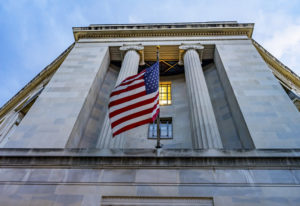
Scholars argue the inspector general is best suited to address ethical abuses within the Justice Department.
After U.S. Department of Justice officials ordered prosecutors to dismiss charges against New York Mayor Eric Adams, several prosecutors resigned from positions in the U.S. Attorney’s Office for the Southern District of New York, including former assistant U.S. attorney Hagan Scotten and former acting U.S. attorney Danielle Sassoon, citing the use of prosecutorial power to influence elected officials to assist the Trump administration’s policy priorities.
In Sassoon’s resignation letter, she cites an article by Bruce A. Green of Fordham Law School and Rebecca Roiphe of New York Law School in which they argue that the Justice Department’s inspector general is the optimal official to investigate politicization within the Department.
Congress created the Department’s Office of Inspector General in the 1978 Inspector General Act to detect waste, fraud, and abuse within the agency, Green and Roiphe explain. The President appoints the inspector general with Senate confirmation. But to maintain continuity across administrations and prevent direct political allegiance, the inspector general does not have a fixed term of office.
Green and Roiphe consider several alternatives to the inspector general but find that none would be as effective in addressing political abuses of power.
First, the Department internally restricts prosecutors’ political activities and—beginning after Watergate and until President Donald J. Trump took office for the first time—limited prosecutors’ communication with White House staff, Green and Roiphe explain.
Internal restrictions governing prosecutors’ political activities and the timing of decisions, however, lack transparency for the public and the press. “Neither the public nor the press” can access the Department’s internal operations to find out whether a prosecutor may have abused their power, Green and Roiphe note. The authors contend that, under internal restrictions, there is no accountability for prosecutors’ partisan or biased behavior unless a court or Congress intervenes.
Unlike other types of internal restrictions in the Department, the inspector general has a “statutory mandate to make an investigation public,” Green and Roiphe point out.
Likewise, although the President may fire the Attorney General if the Department is mismanaged, there is no incentive to do so when the Department “acts to further the President’s own political ambitions or allegiances,” the authors point out.
Second, courts may hold federal prosecutors accountable in two main ways: for their conduct in criminal cases and through the oversight of professional responsibility where a prosecutor practices or is licensed.
In response, Green and Roiphe argue that courts lack the requisite investigative powers to address political bias in prosecutorial decisions. Trial judges, for example, are limited only to decisions about legal questions in cases before them. Even among appellate courts, Green and Roiphe argue that those courts have a poor track record of addressing prosecutors’ partisan behavior.
In her letter and in their article, Sassoon, Green, and Roiphe referenced one of the rare cases that highlights the federal courts’ disciplinary authority, State Bar of Arizona v. Thomas, where the court found that a prosecutor and his deputy misused their power to advance the prosecutor’s partisan political interests. Based in part on the court’s findings, both the prosecutor and his deputy were disbarred.
Green and Roiphe contend, however, that such cases are rare. State disciplinary courts face jurisdictional challenges and are not likely to regulate federal prosecutors. Courts remain “deferential to federal prosecutors’ charging and plea-bargaining decisions.” Moreover, federal courts are limited in their resources.
Third, Congress may investigate federal prosecutors for potential partisan abuses. But several limitations constrain Congress. Congress cannot provide remedies in individual criminal cases or impose sanctions on prosecutors found to have abused their authority.
Congress itself may also be highly partisan, Green and Roiphe argue. During a 2014 House subcommittee investigation, for example, the subcommittee chair argued that “a prosecutor’s prior political decisions indicated bias,” the authors add. They contend that this investigation highlights how the partisan interests of members of Congress may affect substantive oversight.
Finally, the Department contains several internal offices to investigate prosecutorial misconduct, but the authors contend that these offices lack independence from the Department’s political leadership, including the Attorney General.
Green and Roiphe argue that, although the Attorney General may limit investigations requiring access to sensitive information, the inspector general’s ability to investigate Department employees and prosecutors free from interference from other branches of government is necessary to the impartial exercise of power.
Of course, the courts should still resolve issues related to the partisan behavior of prosecutors, and Congress should still continue its oversight role, the authors suggest.
The authors contend, however, that Congress should delegate the primary responsibility to investigate politically-motivated decision-making to the inspector general.
Green and Roiphe discuss the Inspector General Access Act of 2021, a bill that would allow the inspector general, rather than the Department’s Office of Professional Responsibility, to investigate allegations of attorney misconduct. The authors support the inspector general’s greater independence to handle misconduct allegations. The OPR reports to the Attorney General, but the inspector general does not.
Investigations by the inspector general ensure transparency, Green and Roiphe argue. As a result, they conclude that the inspector general is best suited to address the politicization of prosecutorial behavior and to facilitate greater accountability within the Department.



